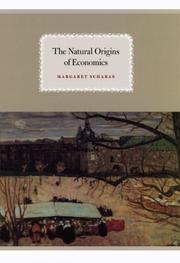| Listing 1 - 9 of 9 |
Sort by
|
Book
ISBN: 1136924965 0415760380 1315031396 1136924892 9781136924965 9781315031392 1306345456 9781306345453 9780714612737 9781136924897 9781136925030 1136925031 0714612731 9780714612737 9780415760386 Year: 2013 Publisher: Oxfordshire, England New York
Abstract | Keywords | Export | Availability | Bookmark
 Loading...
Loading...Choose an application
- Reference Manager
- EndNote
- RefWorks (Direct export to RefWorks)
First Published in 1966. Routledge is an imprint of Taylor & Francis, an informa company.
Book
ISBN: 1629487287 Year: 2014 Publisher: [Hauppauge], New York : Nova Science Publishers, Incorporation,
Abstract | Keywords | Export | Availability | Bookmark
 Loading...
Loading...Choose an application
- Reference Manager
- EndNote
- RefWorks (Direct export to RefWorks)
The quadrupling of the world population in the 20th century has over-burdened the environment and accelerated the depletion of natural resources, whether renewable or not. The effort of the largest nations, China, India, and others, to attain affluence at this time further damages the environment and tax resources. Recently, fertility rates have fallen dramatically, below replacement in much of the world. The number of workers will be declining while the number elderly dependent on their support will be rising. Prospects for affluence are grim for rich and poor nations alike. There is no histo
Economics --- Overpopulation --- Environmentalism --- History. --- Malthus, T. R.
Book
ISBN: 191218673X 1912186748 Year: 2023 Publisher: [Place of publication not identified] : White Horse Press,
Abstract | Keywords | Export | Availability | Bookmark
 Loading...
Loading...Choose an application
- Reference Manager
- EndNote
- RefWorks (Direct export to RefWorks)
Linner traces the development of an international discourse of crisis through the influence of such thinkers as William Vogt, Fairfield Osborn and Georg Boergstroem, labelled 'neo-Malthusians' for their emphasis on an impending clash between population growth and resource limits.
Food supply. --- Malthusianism. --- Scarcity. --- Overpopulation. --- Malthus --- scarcity --- technology --- sustainability --- population
Book
ISBN: 0674027299 0674027078 9780674027077 9780674419407 0674419405 9780674027299 0674419413 9780674728714 0674728718 9780674419414 0674263529 Year: 2014 Publisher: Cambridge, MA
Abstract | Keywords | Export | Availability | Bookmark
 Loading...
Loading...Choose an application
- Reference Manager
- EndNote
- RefWorks (Direct export to RefWorks)
This book could be called "The Intelligent Person's Guide to Economics." The title expresses Duncan Foley's belief that economics at its most abstract and interesting level is a speculative philosophical discourse, not a deductive or inductive science. Adam's fallacy is the attempt to separate the economic sphere of life, in which the pursuit of self-interest is led by the invisible hand of the market to a socially beneficial outcome, from the rest of social life, in which the pursuit of self-interest is morally problematic and has to be weighed against other ends.
Economics --- Philosophy --- Smith, Adam, --- E-books --- Demographers --- Economists --- Population specialists --- Social scientists --- Malthus, T. R. --- Malthus, Thomas Robert, --- Malʹtus, Tomas Robert, --- Ma-êrh-sa-ssŭ, --- Malthus, Robert, --- Author of the Essay on the principle of population, --- Marasasu, --- Essay on the principle of population, Author of the, --- מלתוס, תומס רוברט, --- Philosophy.

ISBN: 1280540354 0511214456 0511216246 0511210876 0511315139 0511493320 051121264X 0521581389 0521588715 052118410X 1107142091 9780511216244 9780521581387 9780521588713 9780511493324 9780521184106 Year: 1997 Publisher: Cambridge Cambridge University Press
Abstract | Keywords | Export | Availability | Bookmark
 Loading...
Loading...Choose an application
- Reference Manager
- EndNote
- RefWorks (Direct export to RefWorks)
Originally published in 2004, this is the second and final volume of manuscripts by or relating to Thomas Robert Malthus (1766-1834) that are now held at Kanto Gakuen University in Japan. Volume I, published in 1997, contains 75 items of correspondence. Volume II, now published, contains transcriptions of further original manuscripts, including: four of Malthus' sermons; his diary of a tour of the Lake District; an extensive set of calculations in the bullion trade, suggesting that he was giving serious thought to becoming a bullion trader on his own account; lecture notes on European history from the fifth to the tenth century; his wife's diary of their holiday in Scotland in 1826 and an essay on foreign trade. These previously unknown and unpublished manuscripts promise insights into his intellectual development and the events and circumstances of his life, as well as glimpses of the lifestyle of his wider family and contemporaries.
Economists --- Population. --- Economics. --- History. --- Religion. --- Malthus, T. R. --- Religion, Primitive --- Annals --- Economic theory --- Political economy --- Human population --- Human populations --- Population growth --- Populations, Human --- Malthus, Thomas Robert, --- Malʹtus, Tomas Robert, --- Ma-êrh-sa-ssŭ, --- Malthus, Robert, --- Author of the Essay on the principle of population, --- Marasasu, --- Essay on the principle of population, Author of the, --- מלתוס, תומס רוברט, --- Malthus, Thomas Robert --- Business, Economy and Management --- Atheism --- God --- Irreligion --- Religions --- Theology --- Auxiliary sciences of history --- Social sciences --- Economic man --- Economics --- Human ecology --- Sociology --- Demography --- Malthusianism --- Social scientists --- Correspondence
Book
ISBN: 9781912186730 Year: 2023 Publisher: [Place of publication not identified] : White Horse Press,
Abstract | Keywords | Export | Availability | Bookmark
 Loading...
Loading...Choose an application
- Reference Manager
- EndNote
- RefWorks (Direct export to RefWorks)
Linner traces the development of an international discourse of crisis through the influence of such thinkers as William Vogt, Fairfield Osborn and Georg Boergstroem, labelled 'neo-Malthusians' for their emphasis on an impending clash between population growth and resource limits.
Food supply. --- Malthusianism. --- Scarcity. --- Overpopulation. --- Population explosion --- Population --- Deficiency --- Shortages --- Eugenics --- Food control --- Produce trade --- Agriculture --- Food security --- Single cell proteins --- Malthus --- scarcity --- technology --- sustainability --- population

ISBN: 0802007902 9786612008191 1282008196 1442681152 9781442681156 Year: 1997 Publisher: Toronto University of Toronto
Abstract | Keywords | Export | Availability | Bookmark
 Loading...
Loading...Choose an application
- Reference Manager
- EndNote
- RefWorks (Direct export to RefWorks)
Samuel Hollander provides the first in-depth study of Malthus's achievement as an economist. Malthus's message has been largely misrepresented by decades of careless and biased interpretation. In this volume, Samuel Hollander re-examines these interpretations and presents a full and coherent picture of Malthus's economics. He evaluates John Maynard Keynes's famous dichotomy between the Ricardian and Malthusian methods, proving that the two were far closer to each other than is generally supposed. The relation of Malthus's ideas to those of his predecessors is thoroughly examined, for example, his roots in the Wealth of Nations are demonstrated and the physiocratic and Sraffian dimensions of his work are brought to light. Hollander extends his analysis to biographical factors; he discounts the textbook perspective on Malthus as a social-welfare pessimist and dispels the common notion of Malthus as spokesman of the land-owning classes. The standard charges against Malthus of inconsistency and intellectual dishonesty are also challenged.Samuel Hollander has produced the definitive study of Thomas Robert Malthus. A major contribution to the history of economic theory, the study has much broader appeal as a portrait of a central figure in early nineteenth-century debates over social policy -particularly those having to do with the role of government in relation to social welfare, economic growth, and trade protection.
Economics --- History --- Malthus, T. R. --- AA / International- internationaal --- GB / United Kingdom - Verenigd Koninkrijk - Royaume Uni --- 330.44 --- Adam Smith. --- Malthus, Thomas Robert --- E-books --- Adam Smith --- Malthus, Thomas Robert, --- Malʹtus, Tomas Robert, --- Ma-êrh-sa-ssŭ, --- Malthus, Robert, --- Author of the Essay on the principle of population, --- Marasasu, --- Essay on the principle of population, Author of the, --- מלתוס, תומס רוברט, --- Great Britain. --- Anglia --- Angliyah --- Briṭanyah --- England and Wales --- Förenade kungariket --- Grã-Bretanha --- Grande-Bretagne --- Grossbritannien --- Igirisu --- Iso-Britannia --- Marea Britanie --- Nagy-Britannia --- Prydain Fawr --- Royaume-Uni --- Saharātchaʻānāčhak --- Storbritannien --- United Kingdom --- United Kingdom of Great Britain and Ireland --- United Kingdom of Great Britain and Northern Ireland --- Velikobritanii͡ --- Wielka Brytania --- Yhdistynyt kuningaskunta --- Northern Ireland --- Scotland --- Wales
Book
ISBN: 1487518161 1442699590 1442644303 9781442699595 9781442644304 9781487518165 9781442699601 1442699604 Year: 2018 Publisher: University of Toronto Press
Abstract | Keywords | Export | Availability | Bookmark
 Loading...
Loading...Choose an application
- Reference Manager
- EndNote
- RefWorks (Direct export to RefWorks)
"Victorian studies scholars have long studied the impact of Charles Darwin's writings on nineteenth-century culture. However, few have ventured to examine the precursors to the ideas of Darwin and others in the Romantic period. 'Marking time', edited by Joel Faflak, analyses prevailing notions of evolution by tracing its origins to the literary, scientific, and philosophical discourses of the long nineteenth century. The volume's contributors revisit key developments in the history of evolution prior to 'On the origin of species' and explore British and European Romanticism's negotiation between the classic idea of a great immutable chain of being and modern notions of historical change. 'Marking time' reveals how Romantic and post-Romantic configurations of historical, socio-cultural, scientific, and philosophical transformation continue to exert a profound influence on critical and cultural thought."--The dustjacket
Evolution (Biology) --- Evolution (Biology) in literature. --- Philosophy. --- LITERARY CRITICISM / Modern / 19th Century . --- Literature --- Charles Darwin --- Evolution --- Friedrich Wilhelm Joseph Schelling --- Immanuel Kant --- Johann Wolfgang von Goethe --- Thomas Robert Malthus

ISBN: 0226735699 0226735702 9786612070204 1282070207 0226735710 9780226735719 9780226735696 661207020X 9781282070202 9780226735702 Year: 2005 Publisher: Chicago, Ill. University of Chicago Press
Abstract | Keywords | Export | Availability | Bookmark
 Loading...
Loading...Choose an application
- Reference Manager
- EndNote
- RefWorks (Direct export to RefWorks)
References to the economy are ubiquitous in modern life, and virtually every facet of human activity has capitulated to market mechanisms. In the early modern period, however, there was no common perception of the economy, and discourses on money, trade, and commerce treated economic phenomena as properties of physical nature. Only in the early nineteenth century did economists begin to posit and identify the economy as a distinct object, divorcing it from natural processes and attaching it exclusively to human laws and agency. In The Natural Origins of Economics, Margaret Schabas traces the emergence and transformation of economics in the eighteenth and nineteenth centuries from a natural to a social science. Focusing on the works of several prominent economists-David Hume, Adam Smith, Thomas Malthus, David Ricardo, and John Stuart Mill-Schabas examines their conceptual debt to natural science and thus locates the evolution of economic ideas within the history of science. An ambitious study, The Natural Origins of Economics will be of interest to economists, historians, and philosophers alike.
Economic schools --- Economics. --- Science. --- Natural science --- Science of science --- Sciences --- Economic theory --- Political economy --- Social sciences --- Economic man --- Economics --- Science --- E-books --- Natural sciences --- economy, economist, modern, contemporary, market, marketplace, capital, time period, era, agency, laws, legal, litigation, 18th, 19th, 20th, century, social, natural, science, david hume, adam smith, thomas malthus, john stuart mill, study, history, historical, historian, philosophy, philosopher, philosophical, neoclassical, economics, french, enlightenment.
| Listing 1 - 9 of 9 |
Sort by
|

 Search
Search Feedback
Feedback About UniCat
About UniCat  Help
Help News
News